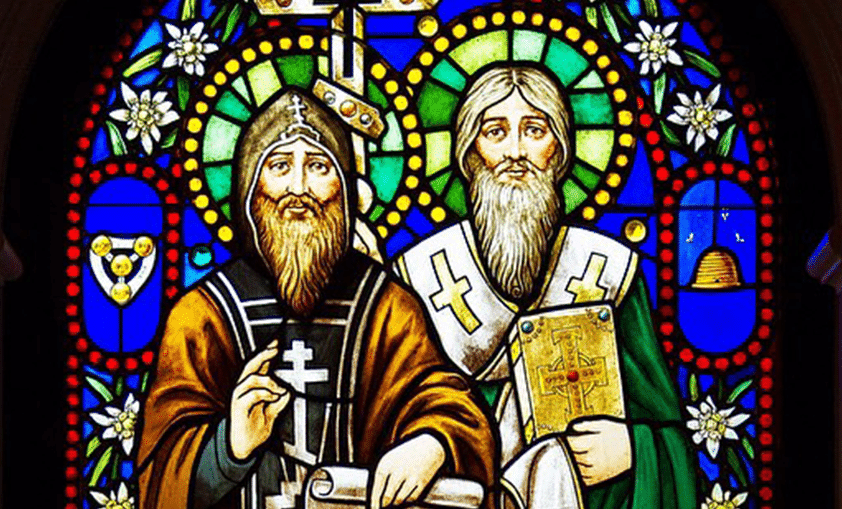The pink and red hearts have been exploding out of the holiday sections of stores since the day after Christmas.
The greeting card, flower, and candy companies have all been coming after us hard for weeks now. They keep reminding us that the holiday of romance is coming up . . . have you bought some stuff?
But not all of us exactly love the holiday of love.
Particularly for Catholic singles, the fuss made about this holiday can start to chafe.
For Catholics, a good antidote for all this commercialized Valentine’s Day fuss could be to look at the saint whose feast day is celebrated on February 14.
But actually, Saint Valentine isn’t even the main saint of the day!
The Catholic Church does still recognize Valentine as a saint, but since there isn’t a ton of reliable information about him, the Church removed him from the liturgical calendar in 1969.
These days, there is actually a different set of saints celebrated liturgically on February 14: Saints Cyril and Methodius.
If you’re eager for an alternative celebration for Valentine’s Day, read on to learn why you should dive into the liturgical life of the Church.
Then, start wishing everyone a Happy Sts. Cyril and Methodius Day this year.
The early life of two holy brothers

Cyril and Methodius were born in Thessalonica, an area that is located in our modern-day Greece.
Both were born in the early 800s, and their family was a prominent family of the Christian community. Cyril and Methodius were two of seven brothers.
Methodius was named Michael at birth, taking the name Methodius when he entered religious life. Similarly, Cyril was named Constantine until he became a monk and took the name of Cyril.
It is not known for certain whether Cyril and Methodius were Slavs, Byzantine Greeks, or a combination.
When Cyril was about fourteen years old, their father died. One of the Empire’s chief ministers, a man named Theoktistos, became the protector of the two brothers.
Theoktistos was responsible for instituting an education program throughout the empire and establishing a university. Both Cyril and Methodius grew up to become learned and scholarly.
Missionary work to the Slavs

Methodius eventually became a civil officer of high importance. When he grew tired of his worldly work, he left his position to enter a monastery.
Meanwhile, Cyril became a professor in Constantinople. His scholarly work was so well-known that he was referred to as “The Philosopher.”
In 862, the two brothers were requested to travel as missionaries to Morovia, a Slavic territory in Central Europe. They were chosen because they were skilled administrators, they knew the Slavic language, and had already worked successfully as missionaries.
In their society at the time, many people were convinced that there was only value in the languages of Greek or Latin. Cyril and Methodius, however, saw value in native languages.
Cyril created a script for the Slavonic language. This script was called Glagolitic, and many consider it to be a precursor of Cyrillic.
Cyril also began translating the liturgy into Slavonic. In the East, the celebration of the liturgy in the vernacular was custom, though in the West it was celebrated only in either Greek or Latin.
The German hierarchy in Morovia used this language difference to undermine the influence of the brothers in the area.
Soon, Cyril and Methodius traveled to Rome in order that the Slavic priesthood candidates could be ordained there.
While they were in Rome, they had to deal with the German bishops’ criticism. But the pope sided with Cyril and Methodius in the conflict and approved their use of Slavonic language.
Methodius and his dedication to the mission

During their time in Rome, Cyril entered the monastic life and died soon after. Legend says that Methodius was so grieved at his younger brother’s death that he intended to retire to a monastery.
But Cyril’s dying wish was for Methodius to return and continue the missionary work that the two of them had started.
Methodius couldn’t actually go back to Morovia at the time because of political circumstances there. However, another Slavic ruler admired the brothers’ Slavic translation work. He requested Methodius to come to his country.
Soon after, the German bishops accused Methodius of usurping their power. They imprisoned him inside a monastery. They even had him summoned to Rome to answer their accusations against him.
Though Methodius continued to face criticism over the years, he did not stop in his good works. He translated much of the Bible and many of the works of the Church Fathers.
By twenty years after the death of Methodius, it looked as if all the work that the brothers had done was gone because of wars and political conflict.
The use of vernacular in the liturgy was forbidden, and Morovia was devastated by invasions.
Despite all this, the work of Cyril and Methodius was valuable. The invasions and the ban of the vernacular allowed the disciples of Cyril and Methodius to go into other countries in the region.
Even though much of their work was begun to fulfill others’ political ambition, the work that the brothers accomplished laid the foundation for the spread of Christianity in the region.
Today, Cyril and Methodius are held in high regard in both the Roman Catholic and the Eastern Orthodox Churches.
They are also considered to be fathers of Slavonic literary culture.
For any of us who are of Slavic origin, who are interested in literary or missionary pursuits, or who are seeking strong sibling relationships, Cyril and Methodius can be great saints to turn to for intercession or inspiration.
Saints Cyril and Methodius, pray for us!



